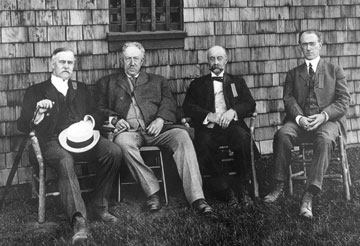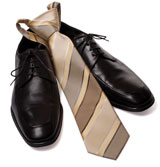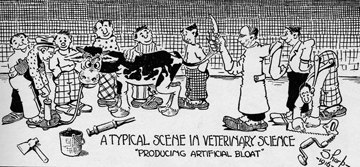Volume 26 · Number 1 · Fall 2008

The professors will see you now.
End Notes
100 Years Ago: Who Needs Office Hours?
In the campus’s earliest days, students and faculty had an easy time finding each other. For one thing, there were only a handful of buildings and not many more people to fill them. For another, students sometimes lived right down the hall from their instructors.
When Ernest Wente of Livermore enrolled in the University Farm’s first class of 1908–09, he stayed in a downtown Davis hotel where some professors also boarded. “So we lived with the profs and had a lot of chance of absorbing a lot of their knowledge,” he recalled in a 1969 oral history interview.
Even though the campus didn’t have a viticulture and enology program at the time, Wente absorbed enough of the professors’ know-how during his studies and his close association with the university over the years to become a pioneering California winemaker. He died in 1981, but the Wente Vineyards started by his father is the oldest continuously operating, family-owned winery in California. Two of the three grandchildren now running the winery also have UC Davis degrees—Phillip ’74 and Eric, M.S. ’74.
75 Years Ago: How Dry We Are
Repeal of Prohibition was big news across the nation in December 1933 but merited only a brief mention in the California Aggie:
“Beer came back, and whiskey and wines are on their way, but so far as the town of Davis is concerned it will remain just as dry as [National Prohibition Act sponsor] Andrew Volstead planned,” said a front-page article. “Although prohibition laws are dead, there is another law which prohibits the sale of intoxicants within a mile and a half of a state institution. With the branch college of agriculture in Davis, this community will stay arid.”
The radius for that ban on alcohol sales was later expanded to three miles; the law remained on the books until 1979.

50 Years Ago: Filling Big Shoes
Emil Mrak, chair of the food technology department, was selected in spring 1959 to become UC Davis’ second chancellor. Mrak told a campus audience years later that his initial screening as a candidate for the post was a surprise. “I recall so well the day when President Clark Kerr and Vice President Harry Wellman, without forewarning me, walked into the building and started to look around. I thought to myself, ‘What the hell have I done wrong, and are they trying to get me out of here?’” Mrak said. “I found out later that that was exactly it. They wanted to move me into the administration building.” Mrak said he got some helpful advice right off the bat from his predecessor, Stanley Freeborn. “He thought I should wear shoes rather than sandals, and also a necktie.”
25 Years Ago: Buried Beefcake
Campus Greek organizations made headlines with their publication of 1984 pinup calenders—one published by sorority Kappa Kappa Gamma that featured men of UC Davis and the other by fraternity Theta Xi picturing female students. The charity fundraisers ended up losing money, according to one newspaper account, but one calendar was preserved in perpetuity. A time capsule buried beneath a 1984 plaque on the north side of Shields Library reportedly contains, in addition to George Orwell’s novel 1984, a copy of Kappa Kappa Gamma’s Men of Davis.
The Cheer That Died

Detail of a 1916 Agricola yearbook illustration by Ben Sharpsteen ’16, who went on to become a Disney animator, director and producer.
Generations of UC Davis students have chanted this cheer:
Bossy Cow-Cow
Honey Bee-Bee
Oleo Margarine
Oleo Butterine
Alfalfa Hay!!
The rally yell, which dates to at least 1916, was an adaptation of UC Berkeley’s equally cryptic Oski Yell:
Oski Wow-Wow!
Whiskey Wee-Wee!
Olee! Muckie-eye!
Olee! Berkeley-eye!
California! Wow!
But there was at least one other University Farm rendition that withered away, either despite or because of imagery that a veterinarian could love. The verse appeared in the 1911 Agricola yearbook’s “Horse Laugh” section, and it went like this:
Tubercular cow, cow
Bubonic flea, flea
O, you trichina worm
Symptomatic anthrax
Wow!!
